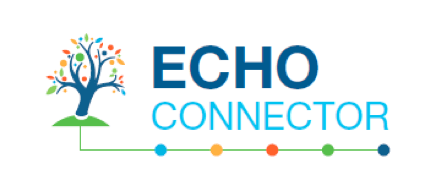 Welcome to the ECHO Connector! The Environmental influences on Child Health Outcomes (ECHO) Program is a research program at the NIH with the mission to enhance the health of children for generations to come. The ECHO Connector will keep you informed of program news and our latest research findings.
Welcome to the ECHO Connector! The Environmental influences on Child Health Outcomes (ECHO) Program is a research program at the NIH with the mission to enhance the health of children for generations to come. The ECHO Connector will keep you informed of program news and our latest research findings.
Message from Matt
A message from the ECHO Director, Matthew W. Gillman, MD

As of this month, all children ages 5 and older can get a COVID-19 vaccine in the United States. It’s a major turning point in the fight against the virus that causes COVID-19, and it’s the best way to protect our children, families, and communities.
I encourage you to visit WeCanDoThis.hhs.gov for information, sharable resources, and outreach tools from the HHS COVID-19 public education campaign, a national initiative to increase public confidence in and uptake of COVID-19 vaccines.
How to facilitate uptake of COVID-19 vaccines among children is an urgent research issue. In this issue of the Connector, we highlight a new study from ECHO’s Institutional Development Award States Pediatric Clinical Trials Network (ISPCTN), which is currently gathering information about parental attitudes around the COVID-19 vaccine. Our investigators will use the insights from this phase of the study to develop and test the effectiveness of a mobile app to aid in COVID-19 vaccine decision making.
This month’s Connector also provides summaries of recent collaborative ECHO research led by Drs. Nikos Stratakis and Erika Garcia of the University of Southern California on how children with asthma can lower their risk of developing obesity; on research led by Dr. Alison Paquette of Seattle Children’s Research Institute on plasticizer chemicals to which pregnant women are exposed; and by Dr. Katherine Sauder of the University of Colorado Anschutz on inadequate and excessive dietary intakes during pregnancy.

—Matthew W. Gillman, M.D., S.M.
Back to top
News You Can Use
ECHO Publication Explores Disparities in Vitamin and Mineral Intake in Pregnant Women
A mother’s intake of key nutrients during pregnancy can have long-lasting consequences for her child’s health. Previous research suggests that a significant number of pregnant women aren't meeting recommended doses of key nutrients.

Prior studies do not tell us what groups are at the most risk for poor nutrition during pregnancy, making it more difficult for doctors and public health workers to help them manage their nutrition. To find out who is most at risk, Katherine Sauder, PhD of the University of Colorado Anschutz led her team and collected data from nearly 10,000 women in 15 ECHO cohorts across 14 states. The investigators looked at the intake of 19 key vitamins and minerals among pregnant women in different sociodemographic and physical subgroups.
The study found that more than one in five pregnant women did not get enough of vitamins D, E, K, and choline and minerals magnesium and potassium, even when taking dietary supplements. Women age 14-18, those who were Hispanic or Black, those who had less than a high school education, and those with obesity were at the highest risk for undernutrition during pregnancy. On the other hand, non-Hispanic women were the most likely to get too much folic acid, potentially putting their child at an increased risk for chronic illness.
“This study shows that the dietary supplements women use today do not help them get all the nutrients they need in the right amounts,” said Dr. Sauder. “Personalized approaches for dietary counseling and dietary supplement recommendations are needed.”
The article, titled “Disparities in risks of inadequate and excessive intake of micronutrients during pregnancy,” is published in The Journal of Nutrition.
ECHO Researchers Investigate the Effects of Phthalate Exposure on the Placenta
Phthalates are a group of chemicals used in plastics and household products, including some personal care products like perfumes, nail polishes, soaps, and hair sprays. Little is known about how these man-made chemicals may affect pregnant women and the health of their developing babies. To investigate the potential effect of phthalates on an infant’s health, Alison Paquette, PhD of Seattle Children’s Research Institute, in collaboration with the ECHO Pathways research team, looked at the association between phthalate exposure in the second and third trimester of pregnancy and gene expression in the placenta after birth.
The team gathered samples from 760 women enrolled in the Conditions Affecting Neurocognitive Development and Learning in Early Childhood (CANDLE) study in Shelby County, TN.

The team measured the levels of 16 different phthalates in urine samples provided by the participants and found that several of these chemicals were associated with changes in gene expression. They found 27 specific biological pathways important to infant development that may have been affected by phthalate exposure.
“Placental gene expression is an important marker that can tell us if the placenta is performing all its normal jobs correctly,” said Dr. Paquette. “If the placenta is not functioning correctly, it may lead to pregnancy complications that threaten the health of both the mother and baby, or cause changes in fetal growth and development.” Going forward, the team plans to study how phthalate exposure and placental gene expression may be linked to other pregnancy complications, like preterm birth, in this same group of women.
The article, titled “A Comprehensive Assessment of Associations between Prenatal Phthalate Exposure and the Placental Transcriptomic Landscape,” is published in Environmental Health Perspectives.
Improving COVID-19 Vaccine Uptake Using a Mobile App
Kids as young as 5 can now get the Pfizer-BioNTech COVID-19 vaccine. While many public officials, health care providers, and parents have celebrated vaccinations for young children as a major breakthrough in the fight against COVID-19, some families are still deciding about vaccinating their children.
To explore parental attitudes about the COVID-19 vaccine and test the effectiveness of a mobile app to help parents learn more about the vaccine for children, ECHO’s Institutional Development Award States Pediatric Clinical Trials Network (ISPCTN) recently launched the Improving COVID-19 Vaccine Uptake Using mHealth Tools (MoVe UP) Study.
Understanding Parental Decision-Making

The initial phase of the study, which is currently underway, involves parents participating in focus groups and individual interviews to assess the factors that influence their COVID-19 vaccination decision-making. The study includes a focus on participants from rural and underrepresented racial and ethnic communities, which have experienced disproportionately lower vaccination rates and greater hardship due to the COVID-19 pandemic.
Testing Effectiveness of a Mobile App Tool
Data from the focus groups and interviews will help researchers develop content for an eventual mobile health tool that will be designed to help parents learn and decide about vaccinating their children against COVID-19. The ISPCTN will then test this mobile app for its impact on pediatric COVID-19 vaccine uptake.
Back to top

ECHO Research Spotlight:
ECHO Researchers Seek to Understand Role of Childhood Asthma in Developing Obesity
Rates of childhood asthma and obesity have been on the rise in the past few decades. Doctors have observed that children diagnosed with asthma often have a higher body mass index (BMI) associated with obesity. These observations led ECHO researchers Nikos Stratakis, PhD and Erika Garcia, PhD, MPH of the University of Southern California to collaborate and investigate the co-occurrence of asthma and obesity in children and the role of asthma treatment in this relationship. The abstract for this research is now available online. Full study results will be published in the January 2022 issue of Epidemiology.

The study tracked more than 8,000 children and teens from 18 different ECHO cohorts across the U.S. between the ages of 6 to 18.5 years. The researchers selected participants who were not affected by obesity at the beginning of the study and looked at whether they developed obesity—defined as having a BMI in the top 5% for their age and sex—over the course of the study. The researchers also collected information on whether the children had received a diagnosis of asthma and whether they were treated with asthma medication.
The study found that children with asthma were 23% more likely to develop obesity compared to children without asthma. However, children with asthma who used asthma medication at a higher proportion had a 64% lower risk of developing obesity compared to children with asthma who used asthma medication at a lower proportion.
“This study showed us that children with asthma may be more likely to develop obesity as they get older,” said Dr. Stratakis, “and asthma medication may reduce this likelihood.”
Read the research summary or the Investigator Spotlight for more information on this study.
ECHO Investigator Spotlight:
ECHO Authors Discuss Link Between Childhood Asthma and Obesity
This month, we sat down with ECHO Program investigators Nikos Stratakis, PhD and Erika Garcia, PhD, MPH of the University of Southern California to discuss their publication “The Role of Childhood Asthma in Obesity Development: A Nationwide U.S. Multi-cohort Study”.
The investigators say that while historically, many research studies have examined the relationship between obesity and asthma, few studies investigate asthma’s causality of obesity. “There is a large proportion of obesity in America, and the same is happening with asthma. There is a lot of research showing that these two epidemics coincide with each other,” said Dr. Stratakis.
Other Effects of Asthma on Children’s Health and Well-Being
“Childhood asthma relates to a number of respiratory conditions during childhood and into your lifetime and adulthood,” said Dr. Garcia. Asthma can have a negative effect on lifelong lung function, and children with asthma have lower lung function growth compared to those without it.
Dr. Stratakis said, “Asthma relates to not only long-term respiratory outcomes, but is a chronic condition that is a heavy burden to children’s families.” Asthma can also cause children to miss school days which can have negative ramifications on their education.
Future Research and Success with ECHO
For future studies, Drs. Stratakis and Garcia highlight the need to better understand the observed effects of asthma medication on reducing the asthma effect on obesity risk. Potential pathways include how asthma control effects a child’s sleep cycles, which then influences obesity risk, or how medication use may increase a child’s physical activity and how that may reduce obesity outcomes. Dr. Stratakis said that things such as prenatal maternal weight and postnatal exposures (1-2 years after birth) are critical to development, and he would like to explore these factors further in a follow-up study.
Drs. Stratakis and Garcia were able to utilize the ECHO Program to ensure results of this study were generalizable. “ECHO provides this great opportunity for populations across the U.S. to examine multiple populations so that evidence can be generalized across multiple regions,” Dr. Stratakis said. He said many cities have air pollution and microbes that can influence asthma rates and health outcomes, so this study is useful in determining the influences of asthma on obesity and other outcomes for children throughout the country.
Back to top
ECHO Discovery
ECHO Discovery is a monthly webinar series with educational presentations for the ECHO community, stakeholders, and the public.

November ECHO Discovery
Systemic Collection of Biospecimens in the Peri-conceptional Period
Traditional studies investigating environmental exposures during pregnancy often recruit women during their first trimester, and as a result these studies exclude data from around the time of conception and create an incomplete and biased understanding of the exposure’s effect. Environmental exposures experienced by both the mother and the father around the time of conception can influence their success in achieving and maintaining a pregnancy.
On November 10, Christy Porucznik, PhD, MSPH of the University of Utah Health shared an example of how studies can successfully collect data on environmental exposures from before conception. Her presentation discussed the success of the Home Observation of Peri-conceptional Exposures (HOPE) study, which recruited couples who were planning a pregnancy before they conceived.
Dr. Porucznik explained how the HOPE study was able to train women to track their ovulation cycle and have both members of the couple collect regular biospecimen samples throughout that cycle until pregnancy was achieved. Urine, hair, saliva, and semen samples were collected and banked for future studies. The timing of the collection allowed Dr. Porucznik and her team to investigate how certain exposures affected time to pregnancy, sperm count and morphology, and sperm epigenetics—analyses that would all be missed by a traditional environmental exposure study.
Dr. Porucznik also highlighted the potential for ECHO studies sites to specialize in and implement a similar remote preconception protocol to gather more extensive and diverse preconception data. Participants who achieve pregnancy can then be transferred into a traditional ECHO cohort for further follow up.
October ECHO Discovery
Decentralizing Pediatric Research: Bringing Science to our families with Wearables, Nearables, and Mobile Labs

On October 18, Sean Deoni, PhD of Brown University, shared his research on MRI techniques and the use of wearable devices to study brain maturation in infants and children.
Throughout his presentation, Dr. Deoni discussed how his study’s use of mobile devices helped measure the effects of the COVID-19 pandemic on neurocognitive outcomes. When they found a steep decline in both verbal and non-verbal cognitive development among young children in 2020 and 2021, they used wearables to investigate why.
Using a device placed on a child’s chest, they were able to remotely measure language activity in homes of children from birth to age 2. They found that the number of adult words the children heard, vocalizations they made, and back-and-forth conversational interactions per hour declined steeply, while TV usage went up. Using wearables, they also found that infant sleep duration increased in 2020 and 2021 compared to pre-pandemic times, while the number of naps per day decreased.
Dr. Deoni said that, although mobile devices may lack the accuracy and sensitivity of in-person measurements, they also allow researchers to take measurements from a larger number of people over longer periods of time. Work is ongoing to use these devices to examine potential influences of infant/child physical activity, outdoor exposure, and air quality.
September ECHO Discovery
Optimizing Neurodevelopmental Assessments in ECHO: Validating Measures and Capturing Critical Periods of Development
On September 8, Kristen Lyall, ScD of Drexel University and Emily Zimmerman, PhD of Northeastern University gave ECHO Discovery presentations on their ECHO Opportunities and Infrastructure Fund (OIF) Award Studies. The OIF is an NIH-funded grants mechanism for early investigators to support projects for the introduction of new research, tools, and technologies in the ECHO Program. Each study examined different testing measures for pre-, peri-, and postnatal neurodevelopmental health outcomes.
Integration of Non-Nutritive Suck and Eye Tracking as Markers of Neurodevelopment Across Five ECHO Cohorts

Dr. Zimmerman presented her research on the association between maternal prenatal stress and infant non-nutritive suck (NNS). NNS refers to when a baby sucks without receiving any nutrition, such as on fingers or pacifiers.
Her study implemented NNS and eye tracking across 5 ECHO Cohorts to assess neurocognitive functions in relation to environmental exposures and maternal stress. Mother and infant participants were from the IKIDS Cohort in Illinois and ECHO-PROTECT in Puerto Rico. IKIDS mothers were predominantly white, married, and had at least a bachelor’s degree, while ECHO-PROTECT mothers were predominantly Puerto Rican and in households earning less than $50,000 per year.
Investigators found that mothers who reported feeling more nervous and stressed, and who had increased feelings of anger, had infants with lower sucking activity. Prenatal maternal perceived stress was significantly associated with fewer but longer sucking bursts in ECHO-PROTECT, which can likely be attributed to lower income and stressful events such as the Zika virus outbreak and hurricane activity.
Validation of Shortened Versions for the Social Responsiveness Scale: Implications for ECHO and Quantitative Trait Research

Dr. Lyall’s presentation was focused around Autism Spectrum Disorder (ASD) and how to lessen the burden of a particular method of measuring ASD-related behaviors, called the Social Responsiveness Scale (SRS).
ASD is a developmental condition that can be characterized by challenges in social interactions and communication, repetitive and stereotyped patterns of behavior and interest, and developmental delays at an early age. The SRS is a widely-used measure of autism-related traits that can be administered by a provider or caregiver.
The research found that shortening the SRS from 65 questions to 16 led to reduced participant burden without substantial loss in measurement of ASD-related behaviors. This can eventually lead to opportunities for wider-scale application. Dr. Lyall is optimistic that the SRS, including the shortened version, can be used to learn more about ASD and related social functioning.
Learn More about ECHO Discovery
Back to top

Subscribe to receive a copy of the ECHO Connector newsletter through email.
Questions?
Contact the ECHO Program Office.



